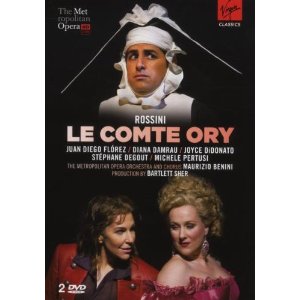First seen in 1828 at the Paris Opera, Le Comte Ory was Rossini’s penultimate opera and his last comedy. Six numbers were “borrowed” from Il viaggio a Reims, which had been rather a private, limited-run affair from three years prior composed to celebrate the coronation of Charles X, but the re-cycled material translated well to Ory. Along with the new numbers the composer wove a tight, just-over-two-hour comic masterpiece out of a flimsy plot: A randy young Count, hearing that all of the men at a castle have gone off to fight in the Crusades, arrives with his men to seduce the women; he is disguised as an ascetic hermit. Just as he is getting somewhere with the melancholy Countess, his tutor comes and unmasks him. The second act finds the Count and his men back at the castle, disguised as nuns—a funny enough image just to imagine—and late in the opera the Count, his Page, Isolier, and the Countess all wind up in bed together. The music is endlessly witty, rhythmically ever-changing, unexpectedly mellow at times, and spicy with woodwinds.
This is the Met’s first-ever production of the work. Recorded in April, 2011, it is a blaze of colors (costumes by Catherine Zuber). Bartlett Sher, by now an old Rossini hand (his Barbiere of a few seasons ago is charming) directs on Michael Yeargan’s sets, which for some reason suggests that we are watching a troupe perform an opera: we can see the ropes and pulleys that move the backdrops and chandeliers, and there’s a crooked old man (more a stage manager than the “prompter” he’s referred to in the program) who gives orders and operates the thunder sheet. There’s nothing in Ory that suggests such a stage-within-a-stage approach, but it does allow for a smaller playing area, and perhaps making the story more intimate was the point. You get the feeling Sher could have allowed for some more imaginative blocking late in the opera, but it’s all in good fun and rarely stoops to conquer.
And what a cast the Met has put together! The title role is taken by Juan Diego Florez, handsome, sly, and tonally shiny, tossing off high notes as if they were easy. Rossini writes high Cs in mid-phrases here: they’re just part of the vocal décor rather than show-stoppers, and so Florez’s ease with them is doubly welcome. He can’t keep his hands off the Countess, here played by Diana Damrau, who acts with just the right oxymoronic ladylike lust. And while her vocal embellishments are occasionally over the top, she’s so secure and charismatic that they never spoil the line. The amazing mezzo Joyce DiDonato sings Isolier (who is enamored of the Countess and vice-versa); there seems to be nothing her voice cannot do and she moves as if she owns the stage. When these three leads wind up in bed near the opera’s close for their 10-minute trio, (“À la faveur de cette nuit obscure”), we don’t care that such a confusion could never take place in Sher’s odd staging of the piece, we’re just grateful to hear such subtle, glorious Rossini singing.
Stéphane Degout, as the Count’s energetic friend Raimbaud, is splendid in the big number in which he and his cronies, still dressed as nuns, discover a cache of wine; his patter and coloratura alternate with bawdy outbursts and then sudden returns to pious music-making from his pals to fool the castle’s women. Michele Pertusi is weak as the Count’s Tutor, and Susanne Resmark, as the Countess’s companion, Ragonde, has trouble with the coloratura but adds a nice, Mistress Quickly-like dark tone to the ensembles.
Maurizio Benini manages to keep the many disparate parts together and leads with great consideration for the singers. He understands that this opera is stylistically different from, say L’Italiana… or Barbiere, and refuses to make a ruckus. Ory became an instant audience favorite at the Met and this DVD will help spread the good word. The clear subtitles are in all major European languages, and a bonus feature allows us backstage at the Met and features shallow interviews with the cast. There is no track listing in the accompanying booklet: this is becoming the norm, and it’s a bad idea. There is only one competing DVD, a 1997 performance from Glyndebourne on Kultur, but this one is way ahead of it.
































